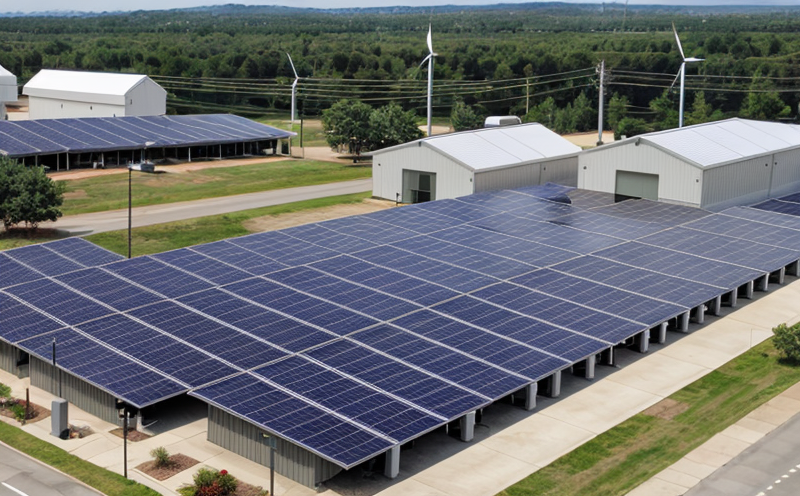IEC 62257 Off-Grid Renewable System Safety Testing
The IEC (International Electrotechnical Commission) Standard 62257 addresses the safety and performance of off-grid renewable energy systems. This standard is particularly pertinent for microgrid and distributed energy systems, ensuring that these installations are safe, efficient, and compliant with global regulatory requirements.
Off-grid renewable systems operate independently from utility grids and rely on various sources such as solar panels, wind turbines, or hydroelectric generators to produce power. The safety of these systems is paramount due to the potential hazards associated with electrical equipment, harsh environmental conditions, and variable energy sources. This standard provides a framework for testing and certification that helps ensure system integrity, reliability, and safety.
The IEC 62257 covers various aspects of off-grid renewable systems including:
- Electrical performance
- Safety measures against overvoltage, short-circuiting, and grounding issues
- Environmental adaptability to ensure systems function correctly in diverse climates
- Operational efficiency under various load conditions
The testing protocols outlined by IEC 62257 are designed to evaluate the robustness and reliability of off-grid renewable systems. Testing parameters typically include:
- Electrical insulation resistance measurement
- Short-circuit current evaluation
- Voltage withstand testing
- Overvoltage protection assessment
To comply with IEC 62257, manufacturers and installers of off-grid renewable systems need to ensure that their products can withstand rigorous testing. The standard also emphasizes the importance of proper installation practices and ongoing maintenance procedures.
By adhering to these standards, stakeholders in the energy sector can enhance the safety and reliability of off-grid renewable systems. This not only protects end-users but also contributes to a sustainable and secure power supply in remote or isolated locations where grid connectivity is unavailable or unreliable.
Why It Matters
The importance of IEC 62257 testing cannot be overstated, especially in the context of renewable energy systems. These systems are critical for providing reliable power to remote communities and large-scale installations where grid infrastructure is either absent or insufficient.
Off-grid renewable systems, powered by solar panels, wind turbines, and other sources, must perform reliably under diverse environmental conditions. IEC 62257 ensures that these systems are robust enough to withstand harsh weather conditions, temperature fluctuations, and other environmental stresses. This is crucial for ensuring the safety of personnel working on or near these installations.
The standard also addresses electrical safety concerns, which are paramount in preventing accidents and fatalities associated with electrical equipment. By adhering to IEC 62257, manufacturers can design systems that meet stringent safety requirements, thereby enhancing public trust and confidence in renewable energy solutions.
Compliance with this standard is not only a legal requirement but also an important step towards promoting the adoption of renewable energy technologies. As more countries commit to reducing their carbon footprints, reliable off-grid systems play a vital role in achieving these goals.
Applied Standards
The IEC 62257 series is part of the broader family of standards that govern renewable energy systems. This includes IEC 61400 for wind turbines, IEC 61215 for photovoltaic modules, and IEC 62389 for microgrids. Together, these standards provide a comprehensive framework for testing and certification.
IEC 62257 specifically focuses on the safety aspects of off-grid renewable energy systems. It covers various critical areas such as:
- Electrical insulation resistance
- Short-circuit current limits
- Voltage withstand capabilities
- Overvoltage protection mechanisms
The standard is regularly updated to reflect the latest technological advancements and safety concerns. Compliance with IEC 62257 ensures that systems are not only safe but also efficient, contributing to a more sustainable energy future.
Use Cases and Application Examples
- Rural electrification projects: Off-grid solar systems are essential for providing reliable power to remote villages where grid infrastructure is non-existent.
- Agricultural installations: Wind turbines and solar panels can supply energy to farms in isolated areas, reducing dependency on diesel generators.
- Remote mining operations: Off-grid systems are vital for powering mines in remote locations where grid access is limited or non-existent.
In addition to these examples, IEC 62257 testing ensures that renewable energy systems can operate efficiently and safely under various conditions. This includes testing the ability of solar panels to withstand snow accumulation, wind turbines to handle high winds, and battery storage systems to ensure long-term reliability.
By ensuring compliance with these standards, stakeholders in the renewable energy sector can enhance the safety and efficiency of off-grid systems, thereby contributing to a more sustainable and reliable power supply.





